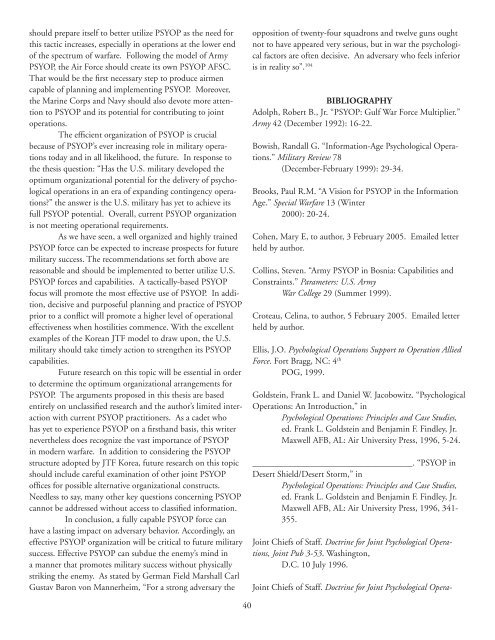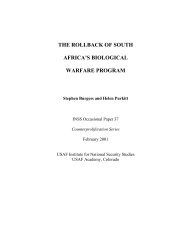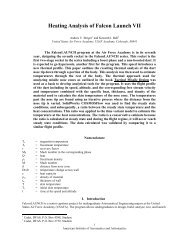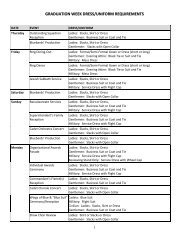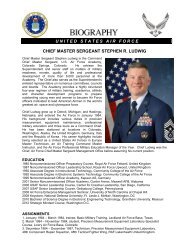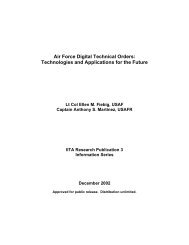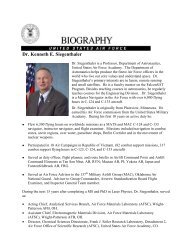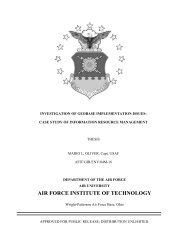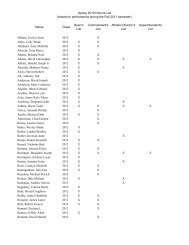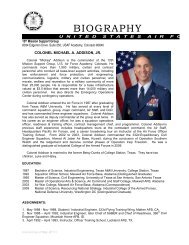Airman Scholar Sp05-1.indd - United States Air Force Academy
Airman Scholar Sp05-1.indd - United States Air Force Academy
Airman Scholar Sp05-1.indd - United States Air Force Academy
You also want an ePaper? Increase the reach of your titles
YUMPU automatically turns print PDFs into web optimized ePapers that Google loves.
should prepare itself to better utilize PSYOP as the need for<br />
this tactic increases, especially in operations at the lower end<br />
of the spectrum of warfare. Following the model of Army<br />
PSYOP, the <strong>Air</strong> <strong>Force</strong> should create its own PSYOP AFSC.<br />
That would be the first necessary step to produce airmen<br />
capable of planning and implementing PSYOP. Moreover,<br />
the Marine Corps and Navy should also devote more attention<br />
to PSYOP and its potential for contributing to joint<br />
operations.<br />
The efficient organization of PSYOP is crucial<br />
because of PSYOP’s ever increasing role in military operations<br />
today and in all likelihood, the future. In response to<br />
the thesis question: “Has the U.S. military developed the<br />
optimum organizational potential for the delivery of psychological<br />
operations in an era of expanding contingency operations?”<br />
the answer is the U.S. military has yet to achieve its<br />
full PSYOP potential. Overall, current PSYOP organization<br />
is not meeting operational requirements.<br />
As we have seen, a well organized and highly trained<br />
PSYOP force can be expected to increase prospects for future<br />
military success. The recommendations set forth above are<br />
reasonable and should be implemented to better utilize U.S.<br />
PSYOP forces and capabilities. A tactically-based PSYOP<br />
focus will promote the most effective use of PSYOP. In addition,<br />
decisive and purposeful planning and practice of PSYOP<br />
prior to a conflict will promote a higher level of operational<br />
effectiveness when hostilities commence. With the excellent<br />
examples of the Korean JTF model to draw upon, the U.S.<br />
military should take timely action to strengthen its PSYOP<br />
capabilities.<br />
Future research on this topic will be essential in order<br />
to determine the optimum organizational arrangements for<br />
PSYOP. The arguments proposed in this thesis are based<br />
entirely on unclassified research and the author’s limited interaction<br />
with current PSYOP practitioners. As a cadet who<br />
has yet to experience PSYOP on a firsthand basis, this writer<br />
nevertheless does recognize the vast importance of PSYOP<br />
in modern warfare. In addition to considering the PSYOP<br />
structure adopted by JTF Korea, future research on this topic<br />
should include careful examination of other joint PSYOP<br />
offices for possible alternative organizational constructs.<br />
Needless to say, many other key questions concerning PSYOP<br />
cannot be addressed without access to classified information.<br />
In conclusion, a fully capable PSYOP force can<br />
have a lasting impact on adversary behavior. Accordingly, an<br />
effective PSYOP organization will be critical to future military<br />
success. Effective PSYOP can subdue the enemy’s mind in<br />
a manner that promotes military success without physically<br />
striking the enemy. As stated by German Field Marshall Carl<br />
Gustav Baron von Mannerheim, “For a strong adversary the<br />
40<br />
opposition of twenty-four squadrons and twelve guns ought<br />
not to have appeared very serious, but in war the psychological<br />
factors are often decisive. An adversary who feels inferior<br />
is in reality so”. 104<br />
BIBLIOGRAPHY<br />
Adolph, Robert B., Jr. “PSYOP: Gulf War <strong>Force</strong> Multiplier.”<br />
Army 42 (December 1992): 16-22.<br />
Bowish, Randall G. “Information-Age Psychological Operations.”<br />
Military Review 78<br />
(December-February 1999): 29-34.<br />
Brooks, Paul R.M. “A Vision for PSYOP in the Information<br />
Age.” Special Warfare 13 (Winter<br />
2000): 20-24.<br />
Cohen, Mary E, to author, 3 February 2005. Emailed letter<br />
held by author.<br />
Collins, Steven. “Army PSYOP in Bosnia: Capabilities and<br />
Constraints.” Parameters: U.S. Army<br />
War College 29 (Summer 1999).<br />
Croteau, Celina, to author, 5 February 2005. Emailed letter<br />
held by author.<br />
Ellis, J.O. Psychological Operations Support to Operation Allied<br />
<strong>Force</strong>. Fort Bragg, NC: 4 th<br />
POG, 1999.<br />
Goldstein, Frank L. and Daniel W. Jacobowitz. “Psychological<br />
Operations: An Introduction,” in<br />
Psychological Operations: Principles and Case Studies,<br />
ed. Frank L. Goldstein and Benjamin F. Findley, Jr.<br />
Maxwell AFB, AL: <strong>Air</strong> University Press, 1996, 5-24.<br />
____________________________________. “PSYOP in<br />
Desert Shield/Desert Storm,” in<br />
Psychological Operations: Principles and Case Studies,<br />
ed. Frank L. Goldstein and Benjamin F. Findley, Jr.<br />
Maxwell AFB, AL: <strong>Air</strong> University Press, 1996, 341-<br />
355.<br />
Joint Chiefs of Staff. Doctrine for Joint Psychological Operations,<br />
Joint Pub 3-53. Washington,<br />
D.C. 10 July 1996.<br />
Joint Chiefs of Staff. Doctrine for Joint Psychological Opera-


